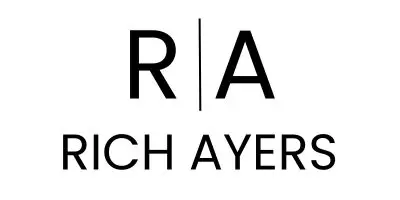Your Questions About Living in Naperville, IL — Answered by a Local REALTOR, Rich Ayers
🏡 Your Questions About Living in Naperville, IL — Answered by a Local Realtor
(I live, work, and sell here—so I’ll give you what I wish I’d known when I moved in.)
1. What is the cost of living in Naperville compared to other Chicago suburbs?
A: Naperville sits at the higher end among Chicago suburbs, but you’re buying more than just a home—you’re getting top schools, strong resale value, and a high quality of life. While you might pay 10-20% more than many neighboring towns, the long-term investment and lifestyle often justify it.
2. How much would a 2-bed/2-bath apartment cost in Naperville?
A: As of 2025, expect mid-$2,000s to low-$3,000s per month for quality 2 bed/2 bath units in desirable locations. Factors like building amenities, proximity to downtown or train station, and age of the complex will push the price up or down.
3. What salary or household income do you need to live comfortably in Naperville?
A: A good rule of thumb for a family of four aiming to home-buy is annual income of $150K–$200K+, which generally allows you to cover mortgage, taxes (2%+ of assessed value), utilities, and the lifestyle you expect in this town. If you’re renting or living smaller, you can get by on less—but budgets need to reflect Naperville’s premium.
4. Is Naperville worth the cost of living compared with other Chicago suburbs?
A: Absolutely—if the things you value are excellent schools, strong resale value, a vibrant downtown, and low crime. If you’re on a tighter budget and those benefits aren’t must-haves, you might find better “value” a little further out. But for many buyers, the premium pays off.
5. Which neighborhoods/subdivisions in Naperville offer the best value for families or first-time buyers?
A: You’ll find strong value in neighborhoods like Westglen, Old Farm, Naper Commons, and Maplebrook II—they may be slightly older, or less flashy, but offer leading schools and access to amenities for somewhat lower cost than the headline suburbs.
6. Should I rent or buy in Naperville if I’m new to the area?
A: If you see yourself living 5+ years and have stable income, buying typically makes sense—especially with resale strength here. If your job or family situation is uncertain, or you’re testing the area, renting gives flexibility. Just know the market moves fast, so readiness matters.
7. How safe is Naperville really—and are there areas I should avoid?
A: Naperville is consistently ranked as one of the safest suburbs in Illinois. That said, like any suburb, some streets are more trafficked or closer to infrastructure (rail lines, busy roads) and may feel less “residential calm.” Working with a local agent (hi!) helps you understand micro-neighborhood differences.
8. What natural-disaster risk is there in Naperville (tornadoes, flooding)?
A: Tornado risk is similar to much of the Midwest—present, but disaster-ready infrastructure is strong. Some older homes back to DuPage River tributaries or lower-lying ground may face higher flood risk—investigate the FEMA flood map and elevation if you’re concerned.
9. How walkable or transit-friendly is Naperville? Do you need a car everywhere?
A: Many neighborhoods (especially near downtown or Metra stations) are walkable—to coffee, dining, shops. However, overall, owning a car is still practical (for school runs, errands, weekend destinations). If you prioritize walkability, focus on East/West Highlands, downtown condos, or Naper Commons.
10. I’m young/single (20s–30s)—is Naperville a good place for me (social life, singles, etc.)?
A: Yes—with some caveats. You’ll find plenty of restaurants, nightlife, and group fitness or volunteer opportunities. The main thing is choosing the right neighborhood (closer to downtown, loft/townhome market) if you want more singles/social life rather than pure family focus.
11. What things should I look for when buying a home in Naperville (schools, lot size, build year, renovation potential)?
A: Key factors: Schools (203 vs 204), lot size (yards matter for resale), build year (1980s vs 2000s often means different maintenance), and inspection items (ROOF, HVAC, basement) especially in older homes.
12. How competitive is the housing market in Naperville? Should I expect bidding wars?
A: In many cases yes—especially for homes in top school districts, near downtown, or with move-in condition. Being pre-approved and ready helps you act fast. In slower zones or older homes needing updates, you may have more negotiating room.
13. What are the typical property tax rates in Naperville and how do they affect affordability?
A: Effective property tax rate often runs around 2.2%–2.6% of assessed value depending on township and district. Because Naperville home values are high, taxes add substantially to monthly payment. When comparing budgets, always factor tax plus homeowners’ insurance and HOA if applicable.
14. What about older homes vs newer builds in Naperville—what should buyers beware?
A: Older homes (pre-1990s) often come with large lots and character, but you’ll want to check roof age, mechanicals, basement condition, and potential renovation costs. Newer builds cost more up front but may require less maintenance in the near term.
15. If I’m thinking about selling in Naperville, what are key selling-points and what turns buyers off?
A: Selling points: Top schools, location near downtown or train, updated kitchen/baths, curb appeal, and a strong HOA/amenity community. Turn-offs: outdated systems, poor yard maintenance, being too far from community conveniences. Bonus: highlighting walking-distance features boosts appeal.
16. What are the best things to do in Naperville (downtown, parks, restaurants)?
A: Don’t miss the Riverwalk, Centennial Beach (summer), the Fine Art Fair, Main Street restaurants, and the 2,400+ acres of parkland. For family-friendly: Springbrook Prairie Forest Preserve, Naper Settlement. For nightlife/social: downtown shows, craft breweries, foodie-spots.
17. What are the major complaints people have about living in Naperville?
A: Common gripes include higher cost of living, traffic (especially around Route 59 / Ogden / 75th), some “cookie-cutter” subdivisions, and occasional competition for top schools or homes that are priced aggressively.
18. If I live in Naperville but commute to Chicago (or elsewhere), what’s the experience like?
A: The commute is very doable—Metra BNSF Line stations at downtown Naperville and Route 59 offer approx 45–55 minutes to Union Station. Car commuters use I-88 or I-355. Hours matter—peak congestion still happens, but it’s manageable with planning.
19. What is the social/demographic mix in Naperville (families, young professionals, retirees)?
A: Naperville is a spectrum: families dominate many neighborhoods, but there are also young professionals (especially near downtown/townhomes) and growing numbers of empty-nesters/retirees (55+ communities and downsizer homes). This mixture helps keep the community vibrant.
20. I’m moving with kids— which school district is best in Naperville and what should I know?
A: District 203 (north/central) and District 204 (south/west) serve Naperville. Both rate very well. Key differences: 203 tends to have older, more established neighborhoods; 204 offers slightly more new-build inventory and slightly lower price-per-sq-ft. Always check attendance maps for your exact address.
21. For renters: what are good apartment or townhome areas in Naperville, and what to avoid?
A: Good rental areas: downtown Naperville for walkability; Mill Street corridor; newer communities near Route 59 for highway access. Avoid areas with heavy traffic, legacy industrial adjacency, or neighborhoods far from amenities unless your budget demands it.
22. For remote workers: can you live in Naperville and work from home comfortably (internet, quiet neighbourhoods, commute minimal)?
A: Absolutely. Many homes offer dedicated study/office spaces. Neighborhoods like Westglen, Brookdale, and Old Farm are quieter and suburban calm. If speed is important, Naperville’s fiber/cable providers are strong. Just confirm neighborhood noise/traffic count during tour.
23. If I’m looking for a house under $500K, what kind of home/lot size should I expect in Naperville?
A: Under $500K you’ll typically find older homes (1980s–1990s) with modest yards (0.2–0.25 acres), some need cosmetic updates. In newer build zones you might see townhomes or smaller single-families. Larger lots + newer homes will generally cost more.
24. How do taxes and cost of living in Naperville compare with nearby suburbs like Aurora, Oswego, or Plainfield?
A: Naperville’s cost—including home price, tax, and HOA—tends to be higher. For example, homes in Oswego or Aurora often cost 10–30% less for similar size and schools. That said, Naperville often offers stronger resale. For buyers working budgets, these nearby towns are worthy comparisons.
25. What surprised people about living in Naperville (good & bad) that they didn’t know before moving?
A: Good surprise: the downtown “small-town” feel inside a major suburb, the incredible class of schools, and depth of parks & trails. Not-so-good surprise: premium cost, quick competition on move-in ready homes, and the need to budget for major systems (roof/AC) in older homes.
26. What neighbourhoods in Naperville are up-and-coming, or offer better value (maybe a little further out but still in good district)?
A: Areas like Naper Commons, Brookdale, and parts of south Naperville near 75th/Plainfield Rd. offer more value. Also, consider the “just outside” edge—Aurora or Oswego addresses feeding into Naperville schools can give value if commute is acceptable.
27. Are there any risks of living in Naperville regarding older infrastructure, homes needing repairs, flood zones, or other hidden costs?
A: Yes—older homes might need updates. Some lots near rivers or creeks may have elevated maintenance/flood-risk. HOA fees can vary widely. Inspectors often find outdated wiring, insulation issues, or older roofing. My advice: walk the exterior, ask for maintenance records, and budget for “year 0–5” updates.
🤝 Closing Thoughts & Next Step
If you’re exploring Naperville and want a local guide who knows the town—not just the ZIP code—I’d be honored to help. I can pull together a neighborhood comparison based on your budget, timeline, commute, and lifestyle wants (schools, walkability, yard size). Let’s chat and make your move feel confident.
Categories
Recent Posts

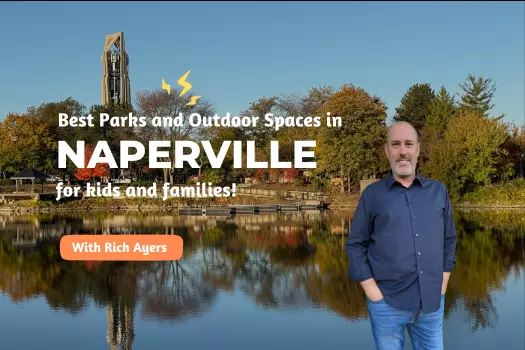
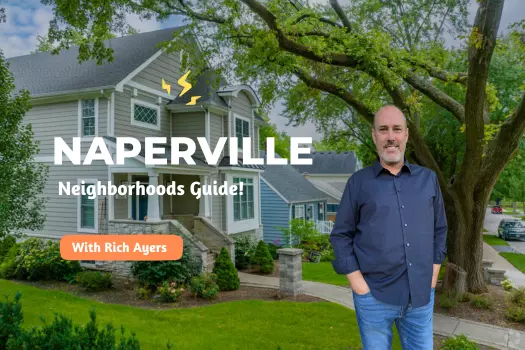

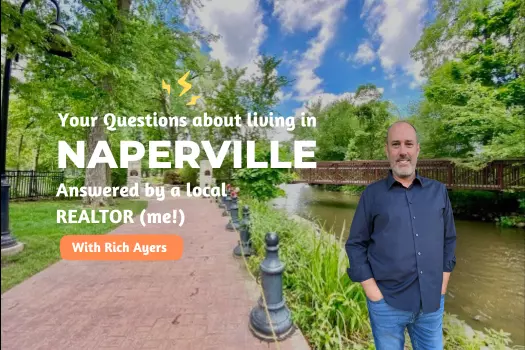


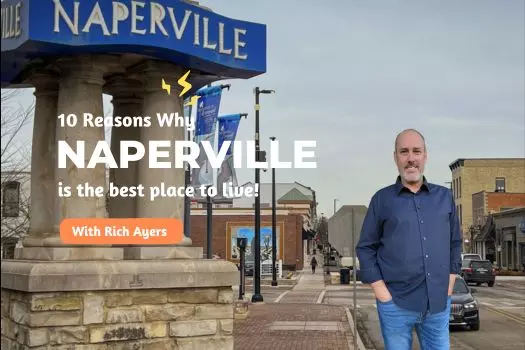
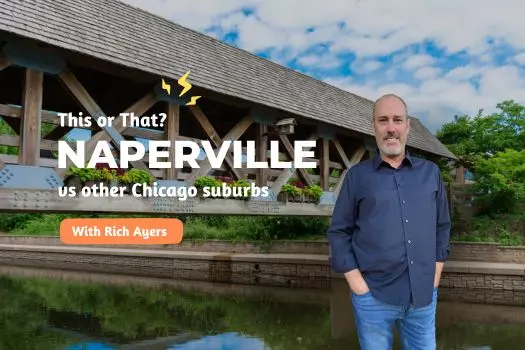
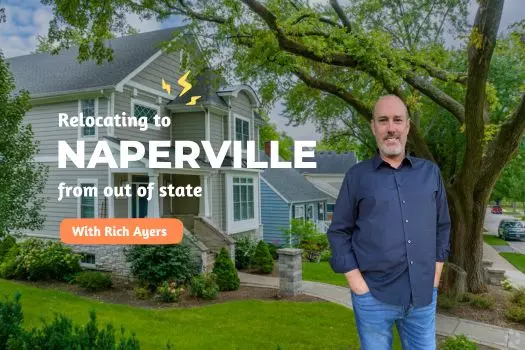
GET MORE INFORMATION

Rich Ayers
Team Lead | Realtor | License ID: 471.001732
Team Lead | Realtor License ID: 471.001732
